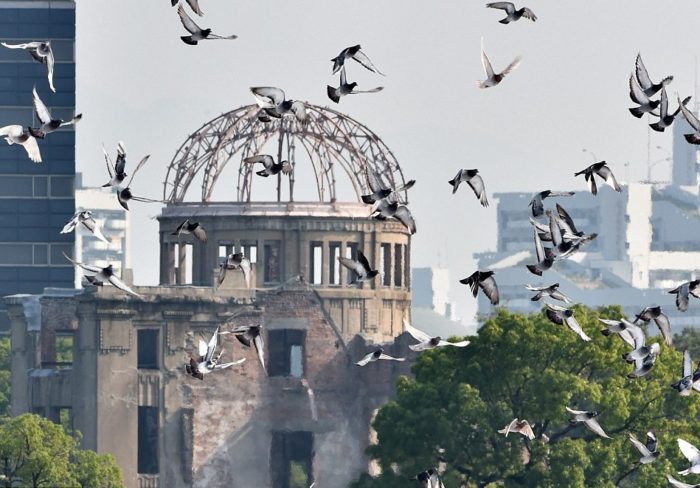Published in the Nikkei Asian Review 18/5/2016
Earlier this month the White House announced that U.S. President Barack Obama will visit the Hiroshima Peace Park after the G7 summit, due to be held at Iseshima, Japan, at the end of May. He will thus become the first U.S. president to visit “ground zero” in the city that suffered the world’s first atomic bombing.
The idea is well-intentioned. The sight of Obama and Japanese Prime Minister Shinzo Abe paying their respects together at Hiroshima’s atom bomb memorial would demonstrate the closeness of the U.S.-Japan alliance, and the ability of former enemies to bury the hatchet.
Yet good intentions do not always lead to good outcomes. There are hidden complications in the visit that could accentuate the differences between the two countries and even damage the dynamics of regional security.
Whatever fine words are spoken, Obama is unlikely to apologize for the destruction of Hiroshima and Nagasaki. The superpower status of the U.S. insulates it from any such requirement, and the American public would probably interpret any apology as a sign of weakness on Obama’s part.
The gap between how Americans and Japanese view the issue has shrunk in recent years, but remains vast. According to a 2015 survey by Pew Research Center, only 14% of Japanese believe the atomic bombings were justified, against 56% of Americans.
The stark difference in position between victors and vanquished 70 years on was highlighted by John Kerry’s preliminary visit to Hiroshima in early April; he laid a wreath, but was careful not to bow or lower his head. In contrast Abe felt obliged to make a series of apologies in 2015 – to Southeast Asian countries, the U.S. Congress, China, Allied prisoners of war, and women used as prostitutes by the Imperial Japanese Army.
While in Hiroshima, Kerry took the opportunity to appeal for a world free of nuclear weapons, which raises another set of problems. Nobody can fail to be moved by the scenes of horror documented at the memorial halls of Hiroshima and Nagasaki and many visitors add their names to the petitions calling for the abolition of nuclear weapons. Yet there is hypocrisy on all sides in such “privileging” of nuclear weapons over conventional methods of mass killing. The firebombing of Tokyo on one night in March 1945 is estimated to have killed some 90,000 civilians, a larger death toll than at Nagasaki.
Furthermore, nuclear weapons were vital to the West’s victory in the Cold War over a Soviet Union that had overwhelming superiority in conventional forces in Europe. Japan also sheltered under the U.S. nuclear umbrella and was able to devote itself to economic growth in safety while maintaining an official stance of virtuous pacifism.
LIFE ON PLANET TRUMP
Another U.S. politician has a radically different take on the issue. In a recent interview with the New York Times, presumptive Republican presidential nominee Donald Trump called for Japan and South Korea to take responsibility for their own security and develop their own nuclear deterrents.
Trump’s comments were met with a frosty silence in Tokyo, but the fact remains that Japan has three nuclear states – China, Russia and North Korea – as neighbours and has not a hope of matching the first two in conventional forces. If Japan ever finds itself on Planet Trump or anywhere similar, it would need the nuclear option regardless of Hiroshima and all it stands for.
The more likely scenario is that the U.S. “pivot to Asia” remains intact, in which case the role of Japan will be crucial. Here, too, the symbolism of Hiroshima could well prove counterproductive. A quarter century after the Cold War ended, Abe has become the first Japanese leader to embark upon the essential but highly controversial task of reconfiguring the U.S.-imposed pacifist constitution and enabling Japan to make alliances and protect its interests like other nations.
Japan’s intelligentsia, particularly the older generation, are bitterly opposed, and public opinion is divided. A year ago, there were large demonstrations against new laws that enable Japanese forces to operate overseas under tightly defined circumstances. Now more of the public supports these laws than opposes them, but Abe had to expend much political capital. The Obama trip and associated media hoopla are likely to empower the pacifists and hinder the Japanese prime minister in his delicate project of persuasion.
Obama’s presidency opened with the award of the Nobel Peace Prize and a visit to Hiroshima might be considered a fitting finale. But the greater test of his legacy in East Asia will be the balance of power he leaves behind and the maturity of the all-important alliance between the U.S. and Japan. Clear support for Abe’s efforts to build a more active role for Japan would be much more constructive than feel-good photo opportunities at the Hiroshima Peace Park.
